China Celebs
Gu’s Year: How Eileen Gu Became a Beloved Icon and Controversial Role Model in China
Patriotic, privileged, perfect? A year after Eileen Gu became an online sensation in China, she is still generating discussions.
Published
3 years agoon

PREMIUM CONTENT ARTICLE
Eileen Gu, the American-born freestyle skier and gold medallist who represented China in the 2022 Beijing Olympics, has made headlines again for her excellent halfpipe World Cup performance during the Chinese New Year. One year after Gu first became an internet sensation, she is, once again, receiving praise and triggering discussions on Chinese social media.
This Chinese Lunar New Year, the three Chinese Winter Olympic athletes Wu Dajing, Xu Mengtao, and Gao Tingyu, were widely discussed on Chinese social media after their debut at the CGM Spring Festival Gala.
Over 8000 kilometers away, another Winter Olympic athlete, Eileen Gu – better known as Gu Ailing 谷爱凌 in China, – also garnered huge attention for her excellent performance at the Calgary halfpipe World Cup. Just as people were celebrating the Chinese New Year, Eileen Gu claimed her second gold medal at the FIS Freeski World Cup.
It has almost been a year since the then-18-year-old Chinese-American freestyle skier grabbed gold at the Olympics and became front-page news in China.
Although Gu already garnered attention online when she announced in June of 2019 that she would switch national affiliation and compete for China, it wasn’t until the Olympics that she appeared all over social media, was featured in dozens of ad campaigns, and practically became a household name in China.
Now, in light of the FIS Snowboard World Cup and the X Games in Aspen, Gu is back in the limelight.
On January 21st, the first day of the Year of the Rabbit, Chinese state broadcaster CCTV celebrated Gu’s victory on social media using the hashtag “Eileen Gu Claims Two Golds within Three Days during the New Year Celebrations” (#谷爱凌过年3天2金#), with a two- minute video clip recording the highlights of her recent race. The hashtag has since received over 180 million views.
Gu herself also shared her victory on Weibo and wished people a prosperous New Year. That post attracted over 110,000 likes.
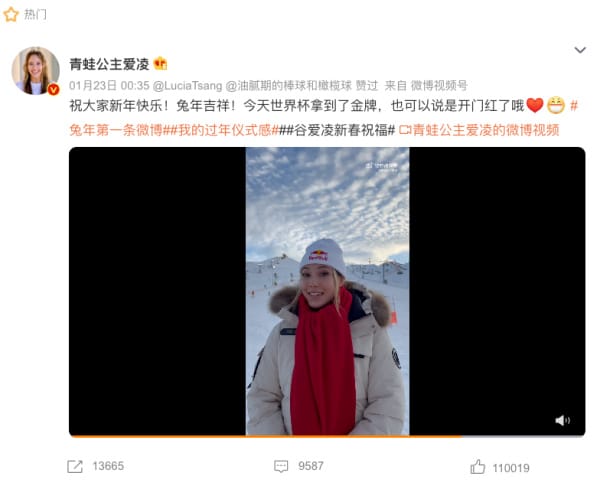
Many Chinese people celebrated Gu’s new achievements with words of admiration, praising her capabilities and determination. One Weibo user commented: “I have to say, Gu Ailing is truly excellent. Three days, two medals. She has an indisputable talent.”
Another user posted a video of Gu practicing while waiting for her flight and commented: “A healthy, energetic, diligent, excellent Gu Ailing who even continues training while waiting for boarding. Success doesn’t come overnight.”
Others also view Gu as a national icon for her gold medal wins for China. The phrase “wèi guó zhēngguāng” (“为国争光”), “winning glory for the country,” appeared in many posts under the hashtag related to Gu’s win.
But over the past year, since Gu’s Olympic success, she has not always merely been viewed as a patriotic hero. Despite her popularity, Gu also triggered controversy and sometimes came under fire, with some wondering if she truly was patriotic and others blaming her for being privileged.
PATRIOTIC
“Everybody knows Eileen Gu is Chinese”
During the 2022 Winter Olympics in Beijing, the fact that Gu had switched her international allegiance and represented China instead of the US instilled pride among many Chinese. Chinese media flooded with stories on Gu that focused on the narrative of the multi-talented “mixed kid” who gave up her United States citizenship to represent the People’s Republic of China.
However, when being asked about her citizenship in interviews, Gu’s replies left many people wondering about the facts of the matter; they wanted to know whether or not Gu actually gave up her American passport, as China does not recognize dual nationality. Gu’s response “I’m American when in the US and Chinese when in China” triggered dissatisfaction among Chinese audiences.
“I have stopped liking her since she said that,” one Weibo user reflected in December 2022, and the post received 35,000 likes. To this day, there are many social media comments bringing up Gu’s comment: “You’re in America, so now you’re American, right?”
Others also attacked Gu after Forbes listed her as the third highest-paid female athlete in the world in 2022 (#谷爱凌年收入1.4亿#). Some commenters argued that she had earned her money in China and was spending it in the US, and that she was unpatriotic for doing so.
However, some netizens defended Gu by stressing what she had done for China. In Weibo posts and comment threads, users supporting Gu wrote: “She won two gold medals and more for China, what did your patriotism contribute to China?” Others also said Gu had shown her love for China through her performances, and that it would be impossible to expect her to distance herself from the country she grew up in.
Meanwhile, Western media outlets described how the bi-lingual Gu had been “dodging” explicit questions about her US citizenship status. This also led to Gu getting attacked by Americans. When Gu returned to the US and enrolled in Stanford University, there was even an online petition about getting Gu’s admittance to Stanford revoked due to Gu’s supposed “lack of integrity about her nationality” and indifference to “the human rights violations” in China.
Among Chinese netizens, questions also rose about whether Gu had only represented China during the Olympics and if her return to the US might mean that she would give up her Chinese nationality and play for the US team instead.
But with Gu’s debut at the FIS Freeski World Cup in the Year of the Rabbit, Chinese bloggers pointed out that Gu’s nationality was still listed as Chinese.
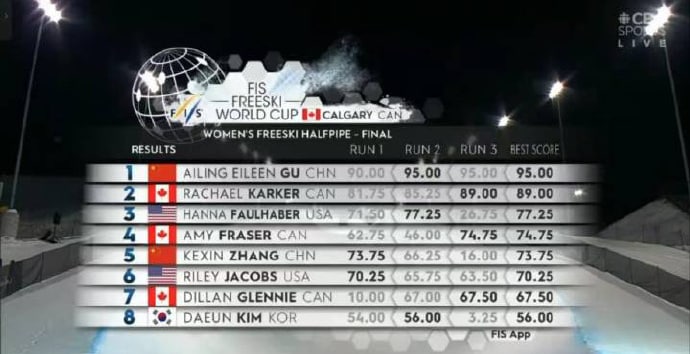
“No matter where she is, Gu Ailing still has the Chinese nationality,” one Weibo blogger wrote, with others also saying: “She is still representing China, we should all support her! The rumors about her changing nationalities are false!”
“Everybody knows Eileen Gu is Chinese,” another social media user wrote.
But not everybody is convinced: “Don’t fool yourself. I’m happy she helped China win gold, but dual citizenship is dual citizenship, there’s no point in covering it up.”
PRIVILEGED
“Gu’s success is unrelated to normal people”
Another discussion that has flared up during Eileen Gu’s past year of success is focused on her alleged privileged status, especially within the context of her being praised as a role model for Chinese (female) younger generations.
In February of 2022, an Instagram comment made by Gu regarding the use of VPNs in China caused some controversy. At the time, one person asked Gu about “internet freedom” in China and how it was possible for her to use Instagram while she was in China, where the platform is blocked. Gu then replied: “Anyone can download a vpn its literally free on the App Store [thumbs up]”
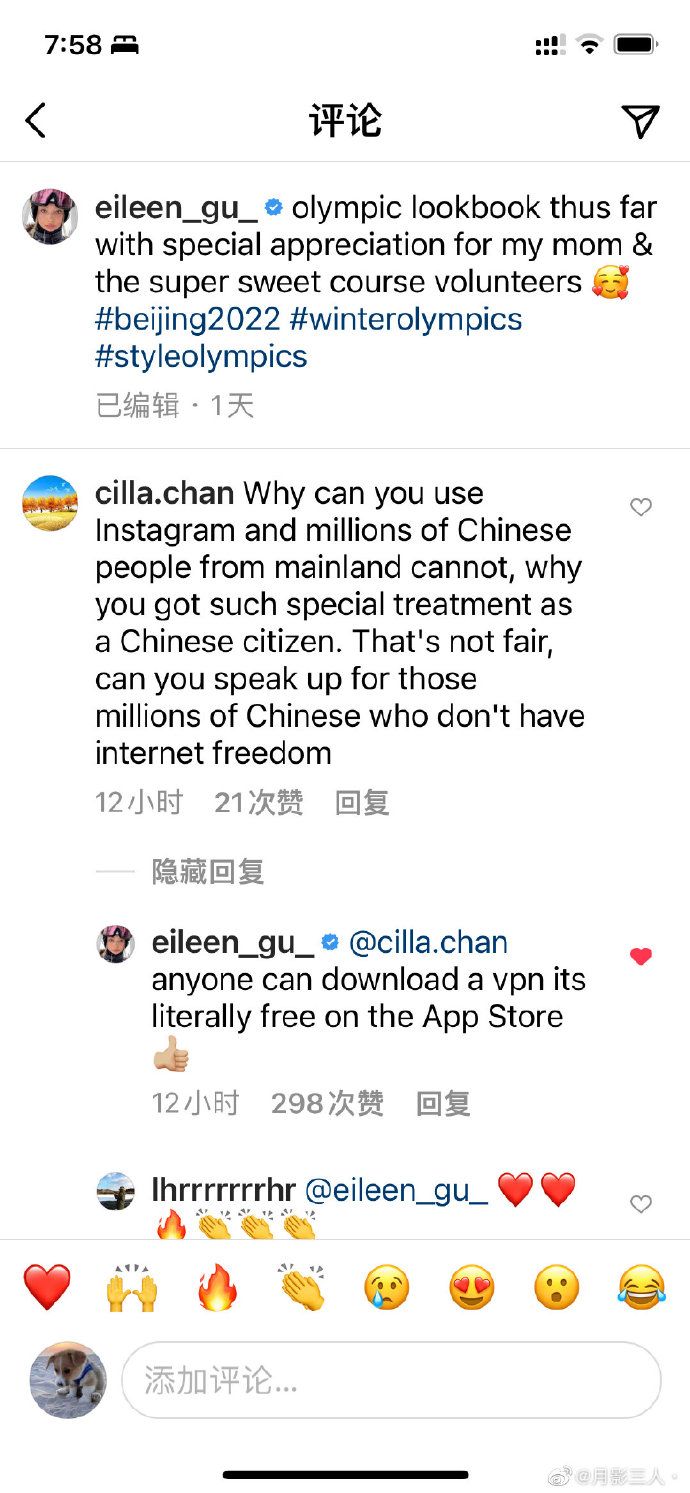
A screenshot of the exchange then circulated on Weibo, where many netizens were surprised about Gu’s statement. VPNs are generally not available on app stores in mainland China, as there are numerous restrictions on virtual private networks (VPNs) which are commonly used to browse websites or apps that are otherwise blocked in China.
Gu was then criticized over the fact that she seemed unaware of the restrictions on VPNs along with her suggestion that ‘internet freedom’ only referred to the accessibility of foreign platforms, allegedly showing her privileged position.
After Gu enrolled in Stanford University and posted her all-A transcript of the first semester at the end of 2022, many praised her hard work but there was also criticism about her “showing off” and strategically choosing a supposedly easier curriculum.
“She posted it to impress Chinese people who do not understand the system,” one person commented, with others replying that an “S” grade does not equal full points and that she had no A+ grades. Others claimed that Gu probably received help with her schoolwork.
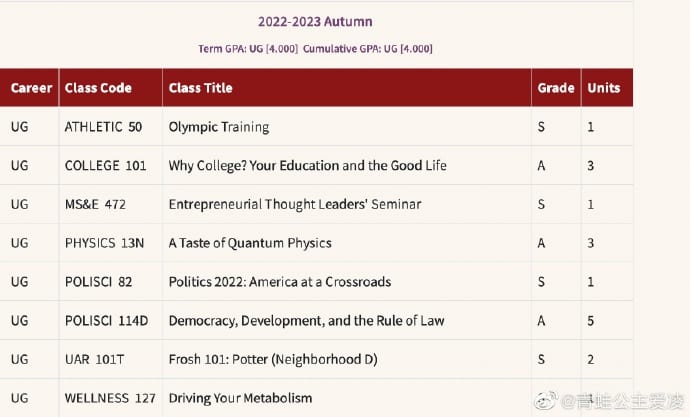
Gu’s Weibo post at the end of 2022 reviewing her achievement of the year, including her transcript of the first semester at Stanford University.
As online discussions intensified (#谷爱凌斯坦福所有课程全部满分#), Gu herself responded to online criticism, stressing that she – without anybody’s help – had worked hard for her grades and that only 5% of students can get an A at Stanford.
The idea that Gu comes from a very privileged background and that it is not just her diligence that brought her success is a recurring one on social media.
Gu was raised by her Chinese mother, a molecular biology graduate who studied at Peking University and Stanford University and who used to be a speed skating athlete as well as a part-time coach at Peking University. She allegedly worked at Wall Street and later became a CEO of a risk investment company. Her grandmother, a former official at China’s Ministry of Transport, was a university basketball player, while her grandfather was a soccer player at school who was also good at swimming, skiing, and skating. Her family members’ background is exceptional. University students were rare among Gu’s grandparents’ generation, and studying abroad was also uncommon for her mother’s generation.
As people believe that this family background has largely contributed to Gu’s success, Gu’s position as a “role model” is questioned.
“Gu’s success is unrelated to normal people,” one Weibo user wrote. “What is the meaning of having this kind of role model? I have no parents from the Ivy League, no pretty face of mixed race, no elite education from the mix of Chinese and American cultures, no exceptional family background, and even no talent,” one Zhihu user wrote.
“Gu started skiing at three years old, and practiced running, basketball, piano, and ballet soon after; I started playing in the mud at three years old and I can still only play in the mud,” another user wrote. “Gu’s mother meticulously planned Gu’s life, but my mother could hardly spare any time for me while she was working.”
PERFECT
“Congratulations, Little Gu, you’re the greatest!”
Amid all the online discussions surrounding Eileen Gu, there is the view that people have not necessarily grown tired of Gu herself but of the (online) media narratives surrounding her which present her as the perfect daughter, the perfect athlete, or the perfect role model.
Some people admit that they feel jealous or say that they feel it is unfair because they feel they could never reach that standard.
One article published by The Paper in 2022 reiterated the popular view that Gu’s success “has nothing to do with ordinary people” (“谷爱凌的成功与普通人没啥关系”), but argued that people should draw inspiration from her story rather than focusing on all the aspects of her life that are unattainable to them.
A commentary by PLA Daily also argued that Olympic athletes should not be turned into “gods” for their overnight success; neither should they be vilified because of their shortcomings. It’s not about the pursuit of perfection, the author wrote, but about facing up to one’s own shortcomings.
There are also those who remind others that Gu is still a teenager. Not only have some of the controversies over the past year shown that Gu is not “perfect,” they also showed that fame is a double-edged sword.
As one netizen put it: “Success can be magnified to an extreme, and mistakes can be enlarged without boundaries (..) She’ll be carefully walking on the sharp edge of the sword because if she does something that does not conform to what people expect of her, the same people who praise you today will step on you tomorrow.”
Meanwhile, many Chinese fans of Eileen Gu have had it with those leaving “sour comments.” “She is representing China, she snatched gold, your empty ‘patriotism’ is contributing nothing!”
“Congratulations, Little Gu, you’re the greatest!” some say: “You did a good job, and we’re proud of you.”
By Zilan Qian and Manya Koetse
Follow @WhatsOnWeibo
Get the story behind the hashtag. Subscribe to What’s on Weibo here to receive our newsletter and get unlimited access to all of our articles:
Spotted a mistake or want to add something? Please let us know in comments below or email us. First-time commenters, please be patient – we will have to manually approve your comment before it appears.
©2023 Whatsonweibo. All rights reserved. Do not reproduce our content without permission – you can contact us at info@whatsonweibo.com.
Stories that are authored by the What's on Weibo Team are the stories that multiple authors contributed to. Please check the names at the end of the articles to see who the authors are.

You may like
China Celebs
Beauty Influencer Du Meizhu Accused of Scamming Fan Out of $27K
Published
5 months agoon
June 27, 2025
🔥 Quick Take: Trending in China
This is a brief update from our curated roundup of what’s trending in China this week. A version of this story also appears in the Weibo Watch newsletter. Subscribe to stay in the loop.
Chinese beauty influencer and livestreamer Du Meizhu (都美竹) is facing online backlash this week after a former female fan filed a police report accusing her of scamming her out of nearly 200,000 yuan (approx. US$27,800).
The fan, known online as Sister Bing (Weibo handle @冰点人a冰点), has come forward with detailed allegations, claiming Du began swindling her in 2022.
Du Meizhu rose to national prominence in 2021 when she was 19 years old and became the first person to publicly accuse Chinese-Canadian pop star Kris Wu (吴亦凡) of rape and sexual misconduct. After at least 24 more victims also came forward, Wu was formally arrested on suspicion of rape in mid-August 2021 and was later sentenced to 13 years in prison.
It was around this time that ‘Sister Bing,’ whose real name is Ms. Zhu (朱, born 1979), started following Du Meizhu on social media. As a hard-working single mother of a daughter, she said she sympathized with Du and wanted to show her some support. In a Weibo post published in 2024, she detailed how Du Meizhu began noticing Zhu’s online interactions in early 2022 and added her as a friend on WeChat.
In private conversations, Du shared complaints about her difficult life, and as the two talked more and more, Zhu began transferring small amounts of money to help. Over time, Du said she needed money for various things—from financial support for school to legal disputes and expensive medical treatments for family members. Between 2022 and 2023, Zhu claims she transferred nearly 200,000 yuan in total.
At the end of 2023, Zhu–who works as a taxi driver–urgently needed money due to a family crisis. She reached out to Du to ask if she could repay the money. According to Zhu, she only returned 30,000 yuan (US$4,180) and refused to pay more, even though at the same time, Du was allegedly flaunting luxury brand purchases and had plans to buy a villa.
On June 25, 2025, Zhu posted an update on her Weibo account, saying she had traveled to Ulanhot City in Inner Mongolia – Du’s hometown – to seek justice and report the case to local authorities.
Du Meizhu has responded to the allegations on social media, writing that she “won’t admit to things I haven’t done.” She does not deny that Zhu gave her money.
She writes: “When she had money, she was lavishly spending it on gifts in all kinds of livestreams. Now that she’s broke, she wants it back from the streamers? After I transferred her thousands of yuan, she’s still not satisfied and is now starting to extort me. No amount of moral pressure will work. I have a clear conscience!”
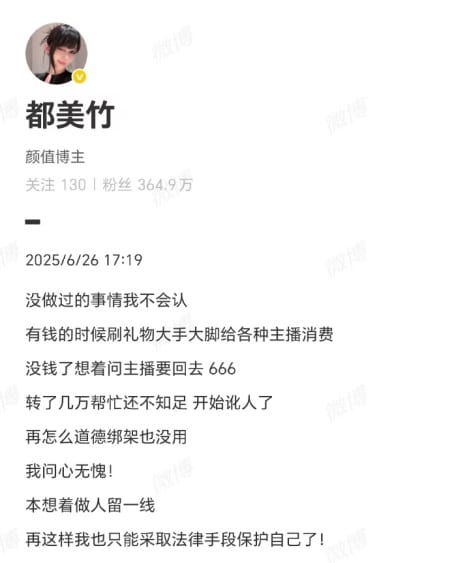
The post by Du Meizhu
The case has blown up online. One post by Ms. Zhu has already received over 133,000 likes and is still gaining traction.
But the developments surrounding the case are puzzling to some. Du Meizhu has long maintained a social media image of wealth, showcasing a lifestyle filled with Dubai travel, horseback riding, luxury food, and fashion. Why would she need to take money from a single mum? Du is being criticized not only for faking her wealth, but also for accepting so much money from a woman who clearly needed the money for her own family.

Du Meizhu social media photos.
Although the story is attracting a lot of attention online because it exposes private conversations between Du and the woman – and, frankly, many netizens just enjoy the drama, – it also says a lot about China’s thriving livestreaming industry and just how close online followers can feel to the influencers they follow. In these kinds of online communities, it is common for fans and followers to send livestreamers money or ‘virtual gifts’.
In the case of Ms. Zhu, some netizens doubt that she can prove in court that she loaned Du the money instead of gifting it to her. People also criticize Zhu: why did she spend so much money on an online influencer instead of on her own daughter?
Either way, many Chinese netizens feel that it was not right of Du Meizhu to take advantage of a single mum like that. Even if she’s not legally wrong, they feel she lacks moral integrity.
Du’s most recent social media post—featuring her in so-called “old money fashion” outfits—has only added fuel to the fire. Dozens of commenters flooded the post with demands that she repay Ms. Zhu. Though Du seemingly tried to delete the negative comments, they kept pouring in. “At this rate, there won’t be any comments left,” one user wrote.
Whether or not Du Meizhu ultimately faces legal consequences, the backlash is already taking a toll. She might escape the courtroom, but won’t be able to escape the court of public opinion.
By Manya Koetse
(follow on X, LinkedIn, or Instagram)
Spotted a mistake or want to add something? Please let us know in comments below or email us. First-time commenters, please be patient – we will have to manually approve your comment before it appears.
©2025 Whatsonweibo. All rights reserved. Do not reproduce our content without permission – you can contact us at info@whatsonweibo.com.
China Celebs
Earring Gate: Huang Yangdiantian and the 2.3 Million RMB Emerald Earrings
Online sleuths connect emerald earrings to post-earthquake business ties—sparking official investigations.
Published
6 months agoon
May 25, 2025By
Ruixin Zhang
Dear Reader,
This week, the Chinese internet exploded over a pair of earrings worn by a child actress.
In recent years, China’s netizens have been paying closer attention to so-called “nepo babies”—the children of the rich and powerful whose success often seems tied more to family connections than to talent.
Some, like Huawei’s heiress Yao Anna (姚安娜), have been criticized for using family ties to enter the entertainment industry. Others, like the infamous “Miss Dong” in the recent medical scandal, have sparked public outrage for abusing privilege to bend academic rules.
Facing economic difficulties and a tough job market, the public’s tolerance for nepotism and corruption is running increasingly thin. But when these issues touch on national trauma, including natural disasters and charity efforts, the public anger runs even deeper.
That’s why a Chinese teenage actress named Huang Yangdiantian (黄杨钿甜) recently found herself at the center of an online storm.
Earring Gate: Behind the Sparkle
Huang, born in 2007, started her career as a child actress in the 2017 historical drama Princess Agents (楚乔传).

She later gained more popularity by starring in other hit series, including Ruyi’s Royal Love in the Palace (如懿传), and also built an online following.
The recent scandal broke out after Huang shared a series of photos on Xiaohongshu, where she has around 328,000 followers. In the photos, meant to celebrate her 18th birthday, she’s seen proudly wearing a pair of sparkly emerald earrings. In the caption, she mentioned they belonged to her mom.
Sharp-eyed netizens quickly identified the earrings as a pair from the British luxury brand Graff—worth a jaw-dropping 2.3 million RMB (319,000 USD).

Digging deeper, online sleuths also found a Weibo post from 2018 showing Huang’s mother wearing a Cartier bracelet, which now retails for around 450,000 RMB (62,400 USD).
Considering Huang’s limited acting experience and modest earnings as a child actress, these luxury items raised eyebrows—and questions about where the family’s wealth was really coming from.
The “online detectives” didn’t stop there. They discovered that Huang’s father, Yang Wei (杨伟), was once a public official in Ya’an City (雅安市), Sichuan Province. After a major 7.0-magnitude earthquake struck Yan’an in 2013 (the Lushan Earthquake), Yang was reportedly involved in post-earthquake reconstruction projects, including investment and tendering.
Interestingly, in 2014, just a year after the earthquake, Huang’s family registered a film and culture company in Shenzhen with 5 million RMB (694,000 USD) in capital. Initially, the company’s legal representative was Huang’s uncle, followed by her mother in 2016. But after Yang resigned from public service, he took over as the official legal representative.
During the pandemic in 2020, Yang also registered a biotech company, which was later rebranded as a beauty and cosmetics trading business. The timing—one company during post-quake reconstruction, then another during a global health crisis—raised suspicions about whether Yang was using national emergencies as business opportunities.
It was also discovered that the Yang family currently lives in a luxury villa in one of Shenzhen’s most upscale neighborhoods, valued at over 100 million RMB (approximately 13.8 million USD).
How did Yang get enough money to start such companies and purchase a multi-million yuan villa? Even if all his official work and business ventures were legitimate, netizens pointed out it still wasn’t enough to explain the family’s enormous wealth.
Huang’s Father Responds, Netizens Dig Deeper
As the controversy grew, Huang’s father responded on May 16 via Weibo, using an account simply named “Huang Yang’s Dad” (黄杨爸爸).
In his post, he claimed that the emerald earrings were fake and of little value. He acknowledged having worked for the Yan’an government but denied any involvement in post-earthquake work, saying the online accusations against him were a case of mistaken identity—“just someone with the same name.” He even added, “I’ve never been corrupt—feel free to report me.”
But the “same name” defense didn’t hold up for long.
In a second wave of ‘detective work’ by online sleuths, netizens found a phone number listed under the name “Yang Wei” on a government website related to post-earthquake reconstruction projects in Ya’an. Some tried sending a small transfer to this number via Alipay, revealing that the profile picture linked to that account was a photo of Huang and her mother when she was younger, immediately making his “same name” explanation completely implausible.
Soon after, the account could no longer be found on Alipay, but because the number was likely tied to many services and platforms, it wasn’t easy to erase entirely. People quickly traced the same phone number to Yang’s accounts on other platforms. Around the same time, the legal representatives of the family’s companies were abruptly changed, only further fueling public suspicion.
Huang’s talent agency issued a statement calling the online rumors false but didn’t offer any concrete evidence to back that up.
By now, a local investigation by the Ya’an Discipline Inspection Commission has confirmed that Yang engaged in illegal business activities and that the birth of his second child (Huang’s younger brother) violated the one-child policy still in effect during his time as a government official. However, the investigation also denied any misappropriation of post-earthquake reconstruction funds. (link).
Most netizens find that many key questions are still left unanswered, and continue to investigate and dissect every single detail relating to Yang, Huang, and the earrings.
More than Online Gossip: Privilege & Public Grief
Some argue that the online speculation surrounding this case has now gone too far.
But for many Chinese netizens, especially younger ones, this isn’t just another scandal passively consumed by the so-called “melon-eating masses” (吃瓜群众). It strikes a nerve because it brings together several sensitive issues all at once.
Although China’s “nepotism babies” frequently spark backlash, they’re also everywhere, from business and entertainment to political and academic circles. For years, the fù èr dài (富二代), or “second-generation rich”—children of those who built fortunes after China’s economic reforms in 1978—have drawn criticism for flaunting wealth and behaving irresponsibly.
Through the years, new terms have been added to China’s nepotism lexicon: there’s xīng èr dài (星二代), referring to the children of celebrities; guān èr dài (官二代), a negative label for the children of government officials or bureaucrats; and hóng èr dài (红二代) and jūn èr dài (军二代), used to describe the children of political elites and military families.
Nepotism is closely tied to corruption—another painful issue in society that surfaces time and again. It’s particularly sensitive because it undermines more than just trust in (local) leadership; it erodes faith in meritocracy and leads the public to question the fairness of the entire system.
When these kinds of issues become entwined with national disasters and charity work—where the already privileged are seen to illegally profit from public grief for private gain—it becomes more than just a breach of public trust. It crosses a moral red line in the most extreme way.
For many young Chinese today, earthquake disasters are not distant history – they’re part of a shared collective memory that still strikes a nerve. In the comment sections of related news posts these days, many netizens recall donating money and supplies to earthquake relief efforts, now wondering whether their goodwill ever truly reached those in need.
The timing has only added fuel to the fire. The controversy erupted around the 17th anniversary of the devastating 2008 Wenchuan earthquake (5.12). Though that disaster is different from the 2013 earthquake, both struck Ya’an City, and public discussions has started to lump them together, bringing back old memories and concerns about disaster relief and public trust.
Back in 2009, Professor Deng Guosheng (邓国胜) from Tsinghua University studied where the 76.7 billion RMB (about 10.5 billion USD) in Wenchuan relief donations had gone. He found that nearly 80% of the money was controlled by the government or groups linked to it, like the Red Cross, with little transparency on how it was spent. People basically have no idea how the money they donated was spent.
In light of the recent controversy, Deng’s study and its numbers are being brought up again in many threads across Chinese social media. Today, as much as 15 years ago, the call for transparancy on how the public’s money is being used in the post-disaster time period is just as relevant.
One Weibo commenter wrote: “For context, in all of 2024, Ya’an City’s general public budget revenue was 8.4 billion RMB in total. This means that the total amount of donations and supplies after the 2008 earthquake was equivalent to 25 years of Ya’an’s current public budget revenue!” He later added: “It’s really not unreasonable at all for the public to ask questions about the authenticity of a pair of 2.3 million RMB earrings.”
Others agree: “It’s absolutely valid for everyone to focus on whether Huang Yangdiantian’s father was involved in embezzlement or bribery (..) When it comes to a tragic event like the Wenchuan earthquake, claims should especially be backed by solid evidence.”
The speculation about Huang’s family wealth goes well beyond celebrity gossip or a “nepo baby” narrative; it reflects a deeper call for clean governance and stricter oversight of how public and charitable funds are managed and spent.
As for Huang, the consequences of her glamorous photoshoot and the controversy it sparked are already unfolding. While her father has now become the target of further formal investigation by disciplinary authorities, it’s rumored that Huang has been removed as the female lead for the historical drama Peacock Bone (雀骨), as well as casting uncertainty over the viability of some of her upcoming projects.
At least we almost certainly know one thing: she won’t be wearing those earrings again any time soon.
Best,
Ruixin Zhang & Manya Koetse
Subscribe
Eye on Digital China is a reader-supported publication by
Manya Koetse (@manyapan) and powered by What’s on Weibo.
It offers independent analysis of China’s online culture, media, and social trends.
To receive the newsletter and support this work, consider
becoming a paid subscriber.

Get in touch
Have a tip, story lead, or book recommendation? Interested in contributing? For ideas, suggestions, or just a quick hello, reach out here.

Signals: Hasan Piker’s China Trip & the Unexpected Journey of a Chinese School Uniform to Angola

About Eye on Digital China — Powered by What’s on Weibo

China Trend Watch: Japan Tensions, Nexperia Fallout, Yunnan’s ‘Wild Child,’ & “Modern Opium”

Eye on Digital China: How Chinese Social Media Evolved from the Blog Era to the AI-driven Age

Trump and Takaichi: The Unexpected Love Affair

The Wong Kar-wai Scandal Explained: The Dark Side of ‘Blossoms Shanghai’

From Schadenfreude to Sympathy: Chinese Online Reactions to Charlie Kirk Shooting

From Nobel Farewell to ‘VIP Toilets’: What’s Trending in China

From Tents to ‘Tangping Travel”: New Travel Trends among Young Chinese

China’s “Post Parade Afterglow”: 6 Social Media Trends
Popular Reads
-

 China Memes & Viral4 months ago
China Memes & Viral4 months agoHidden Cameras and Taboo Topics: The Many Layers of the “Nanjing Sister Hong” Scandal
-

 China Insight7 months ago
China Insight7 months agoUnderstanding the Dr. Xiao Medical Scandal
-

 China Memes & Viral11 months ago
China Memes & Viral11 months agoOur Picks: Top 10 Chinese Buzzwords and Phrases of 2024 Explained
-

 China Digital10 months ago
China Digital10 months ago“Dear Li Hua”: The TikTok/Xiaohongshu Honeymoon Explained



